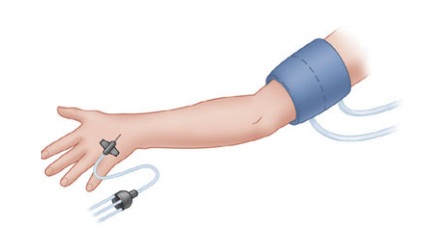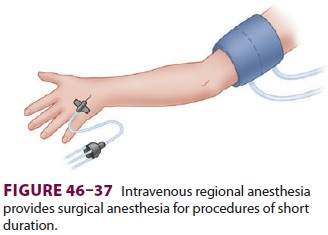Chapter: Clinical Anesthesiology: Regional Anesthesia & Pain Management: Peripheral Nerve Blocks
Upper Extremity Peripheral Nerve Blocks: Intravenous Regional Anesthesia

Intravenous Regional Anesthesia
Intravenous regional anesthesia, also called a Bier block, can provide surgical anesthesia for short surgical procedures (45–60 min) on an extremity (eg, carpal tunnel release). An intravenous catheter is usually inserted on the dorsum of the hand (or foot) and a double pneu-matic tourniquet is placed on the arm or thigh. The extremity is elevated and exsanguinated by tightly wrapping an Esmarch elastic bandage from a distal to proximal direction. The proximal tourniquet is inflated, the Esmarch bandage removed, and 0.5% lidocaine (25 mL for a forearm, 50 mL for an arm, and 100 mL for a thigh tourniquet) injected over 2– 3 min through the catheter, which is subsequently removed (Figure 46–37). Anesthesia is usually established after 5–10 min. Tourniquet pain usually develops after 20–30 min, at which time the distal tourniquet is inflated and the proximal tourniquet subsequently deflated. Patients usually tolerate the distal tourniquet for an additional 15–20 min because it is inflated over an anesthetized area. Even

for surgical procedures of a very short duration, the tourniquet must be left inflated for a total of at
least 15–20 min to avoid a rapid intravenous systemic bolus of local anesthetic
resulting in toxicity. Slow deflation is also recommended to provide an addi-tional
margin of safety.
Related Topics